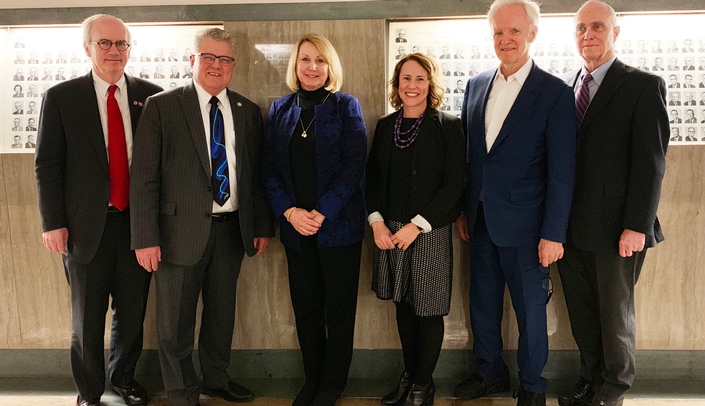UNMC leaders Tuesday testified in support of Legislative Bill 669, which would create a center of excellence in pancreatic cancer and provide hope for individuals who are diagnosed with the deadly disease.
During Tuesday’s Appropriations Committee hearing, UNMC Chancellor Jeffrey P. Gold, M.D., asked the committee to be “a full and active partner” in the fight against pancreas cancer, noting that such public-private partnerships is how Nebraskans get things done.
Introduced by State Sen. Mark Kolterman, LB 669 would appropriate $15 million from the state’s health care cash fund for pancreatic cancer research at UNMC, and would be matched with $15 million in private or other funds.
Kolterman said he wants UNMC to maximize its existing strength in pancreatic cancer research — it is one of three National Cancer Institute Specialized Programs of Research Excellence (SPORE) in pancreatic cancer – so that earlier detection is possible – maybe even a cure. Only Mayo Clinic in Minnesota and Washington University in St. Louis also have a SPORE.
“Recent data reveals that more than 92 percent of people diagnosed with pancreas cancer will die within five years, most within the first year following their diagnosis,” Dr. Gold said. “Too many Nebraskans have felt the devastation of this diagnosis, myself included.”
Dr. Gold’s father died from the disease in 2012. “We must do better,” he said.
James Armitage, M.D., professor of oncology/hematology at UNMC, thanked Sen. Kolterman for “having the vision to recognize a very concerning national trend in cancer discovery and care.”
Sen. Kolterman’s wife, Suzanne, died of pancreatic cancer in November 2017; Dr. Armitage’s wife, Nancy, died of the same disease in February 2017.
“My friends who specialize in the care of patients with pancreatic cancer tell me that it is now the No. 2 cause of cancer death in the United States — and its prevalence is increasing,” said Dr. Armitage, an internationally recognized expert in non-Hodgkin lymphoma who helped advance the field of bone marrow transplantation.
Pancreatic cancer is deadly, Dr. Armitage said, because it is usually not detected until it is advanced and not amenable to surgery. “The disease also has a very adverse biology that makes it resistant to available systemic treatments and not recognized by the body’s immune system,” he said.”
Dr. Armitage encouraged the committee members to support LB 669 and help UNMC physician-scientists increase the momentum needed to change the course of pancreatic cancer. “This is a very difficult disease, but it is not Superman,” he said. “It also has vulnerabilities that, once discovered, will make it more treatable, more curable, and perhaps preventable. There is no reason these advances should not be made in Nebraska, as we have done for other illnesses such as lymphoma.”

I am willing to help and have already devised better therapeutic strategies and new drugs to treat pancreatic cancer. If you would like my help perhaps we could work together.